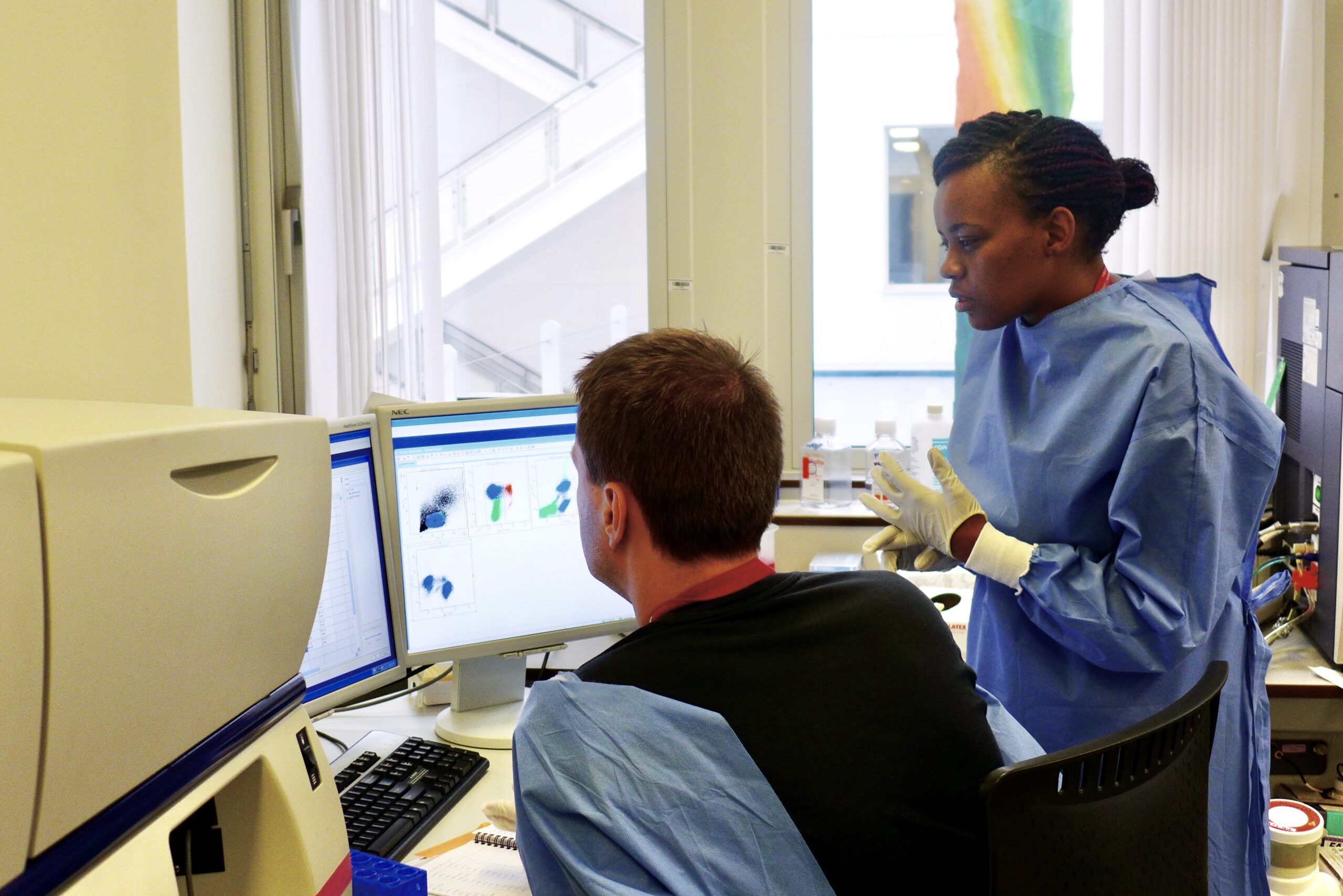The IAVI Human Immunology Laboratory (HIL) is the clinical immunology reference laboratory for IAVI and across the IAVI clinical research center (CRC) partner network worldwide
Established in 2001, the HIL has containment level 2 and 3 facilities for pathogen characterization as well as next-generation equipment and capabilities for analyzing biological samples from research activities. The HIL is integrated into the Infectious Disease department within the Faculty of Medicine at Imperial College London.
Core capabilities of the HIL
- Developing and conducting assays for clinical trials
- Good Clinical Laboratory Practice (GCLP) accredited global operations, including sample and data management
- Clinical site support, including training and technology transfer to global partner labs
- Biobanking capacity to store and manage samples from clinical trials and epidemiological studies

Partnering for innovative research
The HIL plays a central role in strengthening scientific capacity in affiliated African and Indian laboratories to enable independent research and diagnostics activities. These partnerships have led to the establishment of fully accredited GCLP laboratories across Africa, ensuring the standardization of laboratory procedures used in clinical trials. The HIL is closely connected with IAVI vaccine discovery science at its Vaccine Design and Development Laboratory, Neutralizing Antibody Center, and Product Development Center, enabling preclinical and translational capabilities, as well as clinical and regulatory filings.
Global expertise
The HIL and affiliated employees work with partners in Indian and African CRCs, the U.K., and the U.S., and include epidemiologists, immunologists, and virologists. With funding from the U.S. Agency for International Development, the Biomedical Advanced Research and Development Authority, the European Union through Horizon 2020 and the European and Developing Countries Clinical Trials Partnership, CEPI, the Defense Threat Reduction Agency, and the pharmaceutical industry, the HIL’s work has facilitated over 40 vaccine trials globally, with more underway.
Training for the future
The HIL brings together scientific investigators with expertise in the design and execution of clinical trials and serves as a central training hub to enable the development of early career scientists across our African and Indian CRC partner network.
The HIL investigators include:
- Stephen Baker, executive director, human immunology, IAVI
- Peter Hayes, clinical immunologist, Imperial College London
- Arianna Marini, senior manager, clinical immunology, IAVI
- Marija Zaric, senior manager, clinical immunology, IAVI
Read selected publications by HIL investigators and their collaborators
Infection with multiple HIV-1 founder variants is associated with lower viral replicative capacity, faster CD4+ T cell decline and increased immune activation during acute infection[KY1] , 2020 PLoS Pathog, 16: e1008853. (Open access)
Better Viral Control despite Higher CD4(+) T Cell Activation during Acute HIV-1 Infection in Zambian Women Is Linked to the Sex Hormone Estradiol, 2020 Jul;94(16). DOI: 10.1128/jvi.00758-20. (Subscription required)
Cohort profile: IAVI’s HIV epidemiology and early infection cohort studies in Africa to support vaccine discovery, 2020 Int J Epidemiol. Sep 3;dyaa100. doi: 10.1093/ije/dyaa100. (Open access)
HIV-1 variants are archived throughout infection and persist in the reservoir, 2020 Plos Pathogens, Vol:16, ISSN:1553-7366. (Open access)
Adeno-associated virus vectored immunoprophylaxis to prevent HIV in healthy adults: a phase 1 randomised controlled trial, 2019 Lancet HIV, Vol: 6, Pages: E230-E239, ISSN: 2352-3018. (Open access)
Protective HLA alleles are associated with reduced LPS levels in acute HIV infection with implications for immune activation and pathogenesis, Plos Pathogens, Vol: 15, ISSN: 1553-7366. (Open access)
Control of the HIV-1 Load Varies by Viral Subtype in a Large Cohort of African Adults With Incident HIV-1 Infection, 2019 Journal of Infectious Diseases, Vol: 220, Pages: 432-441, ISSN: 0022-1899. (Open access)
Protective HLA alleles are associated with reduced LPS levels in acute HIV infection with implications for immune activation and pathogenesis, 2019 Plos Pathogens, Vol: 15, ISSN: 1553-7366. (Open access)
Inhibitory killer-cell immunoglobulin-like receptors strengthen CD8+ T cell-mediated control of HIV-1, HCV and HTLV-1, 2018 Science Immunology, Vol: 3, ISSN: 2470-9468. (Open access)
African-led health research and capacity building — is it working? 2020 BMC Public Health volume 20, Article number: 1104